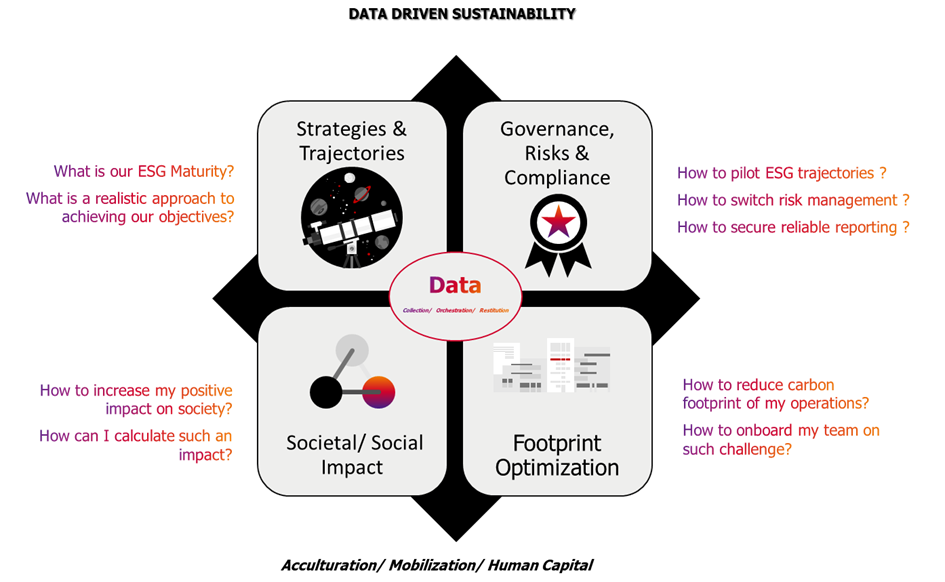In a world where greenwashing is increasingly present, making your sustainability commitments tangible is essential. That’s why we have articulated our entire approach to building a more sustainable world around one of our key skills: data. Integrating, organizing, and leveraging organization-wide data will allow both ourselves and our customers to quantify and make real the commitments that we have made.
Sustainable development is one of the major topics of the moment, with 92% of actors - private and public alike - wishing to invest in it. Interestingly, though, only 41% of these same actors feel confident about achieving their sustainable development goals. At Sopra Steria, we have therefore put in place an offer that aims to support our clients in gaining more confidence in their strategy implementation. This will help them meet their own sustainability challenges and make their commitments a reality.
Sustainable and responsible operations
When it comes to corporate responsibility, it is important to understand that each organization, whether private or public, faces two major issues or challenges. The first is to have operations that are increasingly responsible, so they work towards the reduction of environmental impacts and have a growing positive effect on society.
At Sopra Steria, we are strongly committed to reducing greenhouse gas emissions by 85% per employee by 2040. We have integrated this challenge into our economic model. To cite just one example, we have linked a line of credit of over 1 billion euro to the reduction trajectory of our emissions per employee. As a result, therefore, our environmental performance will now define the cost of the credits we take.
Value proposition
The second issue or challenge, which is extremely complementary to the first, consists in influencing and stimulating your ecosystem toward a virtuous circle of continuous improvement. More concretely, the question is how to guide and support your partners, customers, and citizens toward more respectful and sustainable operating methods.
In order to guide and support our ecosystem, we have put in place a value proposition based on four main pillars with data as the keystone (see figure):- Strategy: defining responsible business models, using realistic and aligned trajectories
- Governance, Risk & Compliance: improving orchestration of your trajectories using optimized environmental management systems and strong data orchestration approaches
- Value chain optimisation: reducing your environmental footprint as close as possible to the field and operational challenges
- Social impact: enhancing contribution to a fair, inclusive, and responsible society

Mapping maturity
The aim of the strategic pillar is to develop a better understanding of the maturity of your organisation. It can be approached from the angle of risk management, compliance, digital maturity or that of the associated data.
Once this clear view of your inventory has been formalised, it is then possible for us to propose trajectories towards your objectives and the commitments you have made. This approach often induces a reflection around an organisation's own products and services. To support you in the creation of new services around sustainable digital transformation or circularity, our product design experts are working closely together with our ESG experts (Environmental, Social & Governance).ESG is key to contributing to new company values, business models and global target strategy. Unfortunately, we often face challenges on implementation of trajectories since trajectories are still addressed in functional or geographical silo (Sales, Marketing, Operations, IT, Finance, … or Headquarter versus regions, countries, …). Addressing strategies and trajectories harmonization is a key success factor to future proof company value and reputational impacts.Environmental management system
The GRC pillar allows us to define a governance framework and reporting. This will make it possible to follow your trajectories and your transformation by implementing an effective environmental management system that is reliable over time. Such a system will help you resist the versatility of the normative pressure but also of the pressures of your ecosystem.
Working on impacts
Finally, once your inventory is clear, your trajectories harmonized and your transformation orchestration tools put in place, we can work on very concrete actions or projects to reduce your environmental impact or increase your positive social impact. Sopra Steria has the capacity to support you with function optimization (sustainable IT, responsible procurement, …) but also on transversal use cases. Examples are the optimisation of buildings or of vehicle fleets (as we did for TEC, the public transport operator in Belgium’s Walloon Region), the calculation of the impact of social policies on populations (as we did for SPF BOSA, the Belgian Digital Transformation Office), and a whole series of other projects ranging from support for sustainable digital labeling to the redesign of a purchasing department for more responsible procurement approaches.
Committed to sustainability
Whether in our own operations or in supporting our customers with their digital transformation, the approach of Sopra Steria Benelux to a more sustainable world covers all environmental, social, ethical and community commitments. As we anticipate and understand the challenges of both digital technology, ESG challenges and Operational Excellence challenges of your activities, we strive to better assess their impact on our clients’ and society’s sustainability objectives and advise our clients on the best way forward.
Are you also in need of such expert advice? Don’t hesitate to contact me.